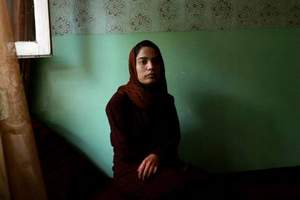Chris Sands, The National, September 5, 2010
She describes the Taliban and the foreign troops as “enemies” and believes both must be opposed.

With international forces edging close to withdrawal and Taliban violence on the rise, Afghanistan’s women appears to be facing a grim future.
A suspected poison gas attack on a girl’s school in Kabul last month highlights the dangers that exist in a society dominated by patriarchal tribal traditions. Dozens of students were injured in the kind of incident that is becoming commonplace across the country.
Faced with this climate of intimidation, women are starting to debate what role they will have in the years ahead as the political momentum at home and abroad shifts towards some sort of peace deal.
For example, the Afghan president, Hamid Karzai, yesterday announced that he had set up a council to pursue negotiations with the rebels, and the US is due to begin pulling out its troops next July.
But not everyone is willing to accept the compromises those plans probably will require.
Among the loudest critics of the war and a possible deal with the Taliban is Malalai Joya, a member of parliament.
Since she publicly denounced the past human rights abuses of fellow delegates at a grand assembly in 2003, she has become famous for speaking her mind on subjects that could get her killed.
Now living in hiding in Kabul, Ms Joya would seem to have good reason to worry about the power vacuum some Afghans fear will develop when US troops begin to leave.
But she wants the immediate withdrawal of foreign forces and is against any attempt to make a deal with the Taliban leadership.
“Democracy never comes with occupation and it never comes from sworn enemies of democracy, women’s rights and human rights,” she said.
After the Taliban captured Kabul in 1996, they imposed strict laws under the guise of bringing social order following years of sectarian conflict. Women could not walk the streets unless accompanied by a male relative and most were barred from working outside the home. They were also forced to cover their faces in public.
For Ms Joya, an end to the Nato presence here does not necessarily mean a return to those dark old days. She describes the Taliban and the foreign troops as “enemies” and believes both must be opposed.
“When we don’t have security, which is more important than food and water, how should we talk about other issues: women’s rights, human rights, democracy?” she said.
Ms Joya’s willingness to speak her mind has often landed her in trouble in a country still ruled by the gun and where few people are prepared to openly denounce the rich and powerful. Happiness and disgust could be seen on the faces of those who witnessed her speech in 2003; some applauded her words and others were infuriated.
After being elected an MP for the south-western province of Farah two years later, she continued to criticise the former mujahideen militia commanders who had a key role in the Afghan civil war in the 1990s that paved the way for the Taliban’s emergence.
But when Ms Joya compared parliament unfavourably to an animal stable in 2007, she was suspended from her position. She is not standing for re-election this month, claiming that voting will be fixed.
Instead, she will continue to divide her energy between giving lectures abroad and carrying on with her campaigning at home.
“As much as we intellectuals, we democrats, can do, we must do, even if it will cost our lives,” she said.
Her strident views are just a part of a wider discussion that women from one of the world’s most conservative societies are having about their future.
This debate was highlighted recently when Time magazine ran a controversial cover photograph of an Afghan teenager named Aisha whose nose and ears were cut off by her husband last year. Accompanying the picture was the headline “What Happens if We Leave Afghanistan”.
Ms Joya said the image “misused the misery of women”. However, the aid organisation that first dealt with Aisha’s case disagreed and is alarmed by the possible fallout of a foreign troop withdrawal.
Women for Afghan Women is a New York-based non-governmental organisation that works in five provinces, running family guidance centres and shelters. Huma Safi, the group’s national programme manager, defended the photograph and insisted it was not designed simply to shock readers.
“We wanted people to know what the situation for women is in Afghanistan. Still these things are happening. People should know this,” she said.
Ms Safi said she was “concerned” about the prospect of the foreign troops’ leaving and a deal being struck with the Taliban.
“Our request to our government and also the international community is just to put the issues of women on the top when they are thinking or talking about these negotiations,” she said.
Mr Karzai has vowed to do that. So has Hillary Clinton, the US secretary of state. At a conference in Kabul in July, she warned that peace and stability “cannot come at the cost” of the female population.
Among the people who met Mrs Clinton during that visit was Hasina Safi, another NGO worker. As executive director of the Afghan Women’s Educational Centre, she recently explained that there was no sign outside the group’s office because if there is a protest in the streets the first thing demonstrators will do “is attack the women’s organisations”.
Despite these dangers, Ms Safi believes the world will not abandon her and her colleagues.
“We are a little worried about this, but we are sure that on the whole the government of Afghanistan and the international community, of course, will not close their eyes,” she said.